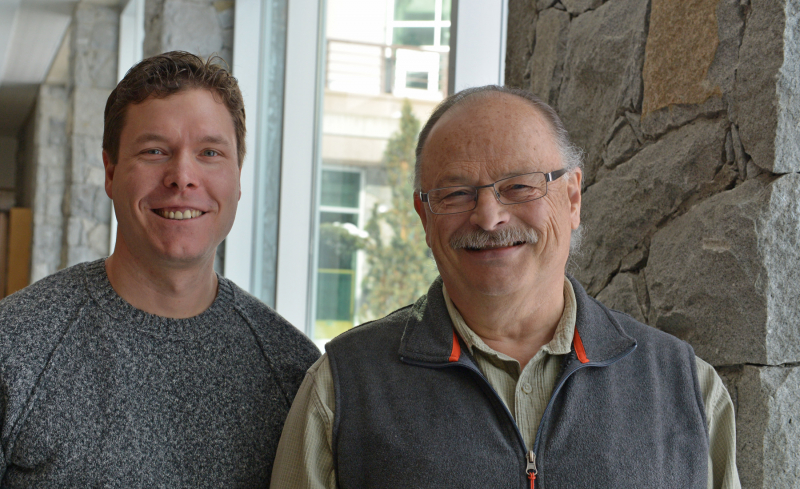UNBC, Carrier Sekani Family Services partner on $1.5M Elder wellness project
UNBC’s Dr. Henry Harder and Dr. Travis Holyk with Carrier Sekani Family Services (CSFS) have received a $1.5 million grant to pursue a five-year research project focused on strengthening mental wellness and suicide prevention for Elders in B.C.’s Northern Interior. The funding is provided through the Institute of Indigenous Peoples' Health, part of the Canadian Institutes of Health Research (CIHR).
The project will build on Harder and Holyk’s collaborative work with regional First Nations communities and stakeholders over the past decade, which has sought to examine and enhance mental health wellness in Indigenous youth and young adults.
“This research, from its inception, has been community led, and it was our communities that indicated that mental health and suicide prevention needed to be addressed,” said Holyk, Executive Director Research, Primary Care and Strategic Services, CSFS, and adjunct professor at UNBC. “The work to date has supported our organizational vision of providing services throughout the life cycle, and this next phase will help to complete the continuum as we seek to develop sustainable interventions for Elders.”
“The motivation for our ongoing work has been to provide support and assistance to communities that are often underserved. There is a huge gap of psychological services in the North,” said Harder, a Psychology and Health Sciences professor, and Dr. Donald B. Rix BC Leadership Chair for Aboriginal Environmental Health. “We are looking at ways to empower First Nations communities to look at what services they themselves can provide to be of assistance to their fellow community members and to help make their communities healthier places to be, emotionally and psychologically as well as physically.”
Over the next five years, the project will seek to develop tools and activities that help further increase community mental wellness and improve access to interventions across the life course with a specific focus on Elders. The project will implement and evaluate intervention across member nations of Carrier Sekani Family Services. It will also seek to share the suite of materials created through the study with other First Nations communities.
“The issue of suicide among Indigenous communities is typically much higher than that of the Canadian population, and while society continues to look for solutions to address this matter, it falls short on a successful strategy and funding,” said Warner Adam, CEO, Carrier Sekani Family Services. “Suicide and suicidal ideation prevention programs in the elderly population is virtually nonexistent. Along with our partners, we hope to examine strategies so that we can provide some insight on policy, program design and delivery based on our findings.”
Project partners and in-kind contributors include Northern Health, UNBC, Carrier Sekani Family Services and numerous Indigenous stakeholders across the North.
“What inspires me is that, although the research tackles a difficult subject, we are taking a strengths-based approach that acknowledges and supports the importance of revitalizing Carrier and Sekani culture,” adds Holyk, “by incorporating cultural values and land-based approaches to teaching about suicide and healing directly into the research methods.”
As a critical component, Indigenous research methodology will be used as the framework for all phases of the project.
“What sets Indigenous methodology apart is that it starts and ends with community,” explains Harder. “It means working with community members who help us to identify the project priorities and also point to the best ways to uncover the information needed to find solutions and best outcomes. Basically, it puts the community ahead of the researcher, and we only pursue activities that directly benefit the community.”
“Strong partnership between UNBC and Indigenous communities and advocates is critical to many of our research undertakings,” said Dr. Daniel Weeks, UNBC president. “It is through ongoing collaboration and engagement that often the best and most innovative solutions can be uncovered. This long-running research initiative will profoundly impact the lives of Indigenous families for generations to come.”
This project is supported by the Research Support Fund, a tri-agency initiative of the SSHRC, CIHR and the Natural Sciences and Engineering Research Council (NSERC), which assists Canadian post-secondary institutions and their affiliated research hospitals and institutes with the expenses associated with managing the research funded by these three federal research granting agencies.
Contact Information
Sonya Kruger, Communications Officer
250-960-5122 | sonya.kruger@unbc.ca

